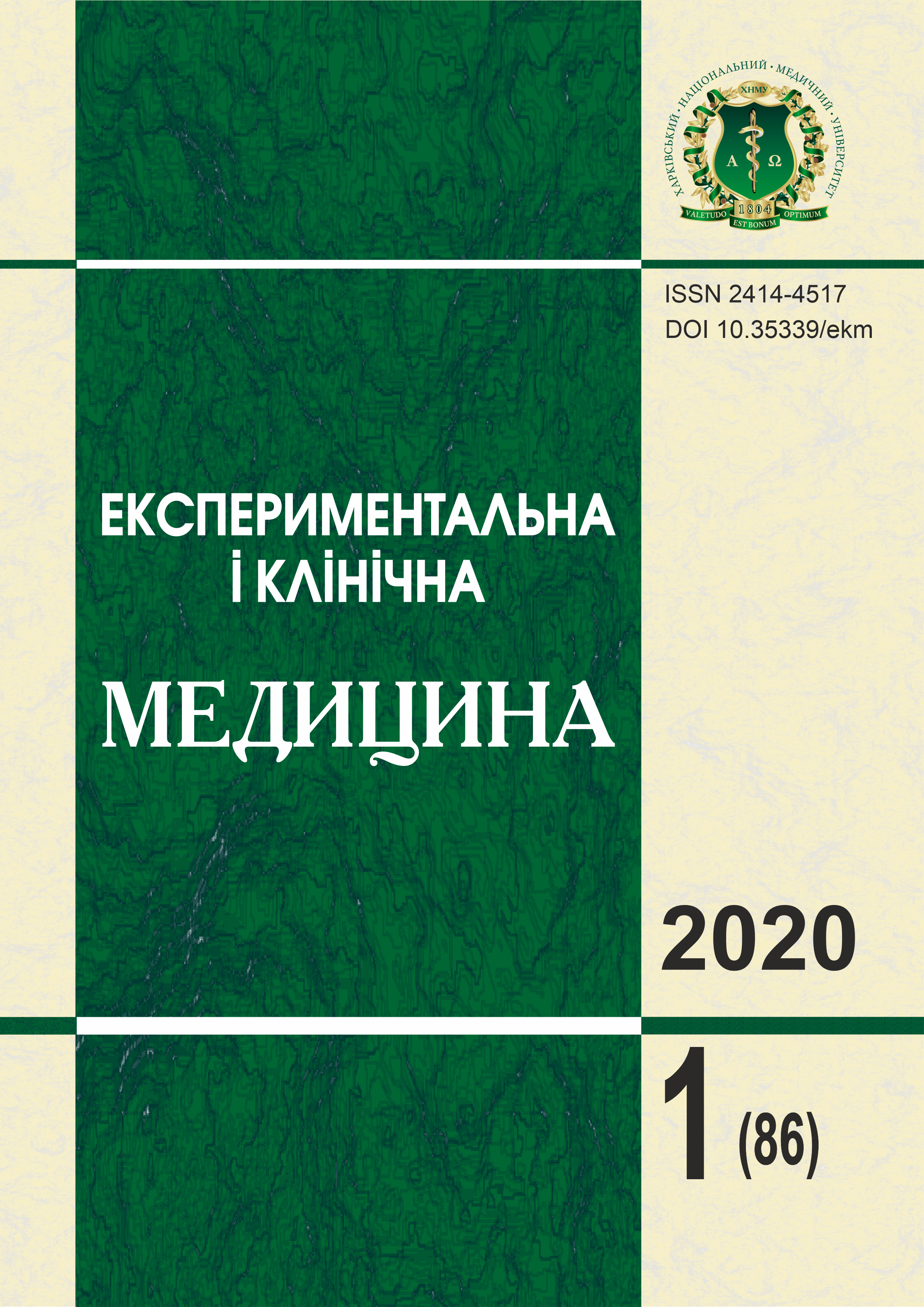Abstract
A study of 114 patients who received renal replacement therapy by peritoneal dialysis, whose average age was (47.9±1.2) years, the duration of dialysis therapy - (53.0±2.3) months. EchoCG results with Doppler, bicycle ergometric loading ECG tests are analyzed in dynamics. Depending on the detected changes, patients were divided into five clinical groups. The first group included patients who suffered an acute myocardial infarction during the study. To the second - patients with stable angina. To the third - patients with painless myocardial ischemia. The fourth group included patients with ischemic dilated cardiomyopathy (IDCMP). Fifth - the comparison group, which included patients without signs of coronary heart disease. Patients were determined biochemical parameters of phosphorus-calcium, lipid metabolism, proinflammatory interleukins (TNF-a, IL-1ß, IL-8), C-reactive protein and CAA protein. It was found that cardiorenal syndrome in patients with chronic kidney disease on peritoneal dialysis leads to the progression of coronary heart disease. The formation of different clinical variants of coronary heart disease in such patients is multifactorial, initiated by impaired lipid metabolism with subsequent immunological changes in combination with the processes of remodeling of the left ventricular myocardium, calcification and fibrosis of the aorta, cardiac structures and heart valves. Proinflammatory interleukins TNF-a, IL-1ß, and C-reactive protein are most likely predictors of acute myocardial infarction, whereas IL-8 and acute inflammatory protein (serum amyloid) are associated with ischemic dilated cardiomyopathy, in patients with chronic kidney disease on peritoneal dialysis.
Keywords: renocardial syndrome, renal replacement therapy peritoneal dialysis, coronary heart disease, heart failure.
References
Eknoyan, G., Levin, N. W. (2002). K/DOQI clinical practice guidelines for chronic kidney disease: evaluation, classification, and stratification. Am J Kidney Dis, 39(2-1), 1-266.
Matsushita, K., Ballew, S. H., Astor, B. C. et al. (2013). Cohort profile: the chronic kidney disease prognosis consortium. Int J Epidemiol, 42 (6), 1660-1668. DOI: 10.1093/ije/dys173.
Ronco, C., Haapio, M., House, A. A. et al. (2008). Cardiorenal syndrome. J Am Coll Cardiol, 52(19), 1527-1539. DOI: 10.1016/j.jacc.2008.07.051.
Kravchenko, V. V., Kolesnyk, М. О., Lishchyshyna, О. М. et al. (2017). Unifikovanyi klinichnyi protokol vtorynnoi (spetsializovanoi) ta tretynnoi (vysokospetsializovanoi) medychnoi dopomohy. Likuvannia patsiientiv z khronichnoiu khvoroboiu nyrok V stadii: profilaktyka, diahnostyka ta likuvannia sertsevo sudynnykh zakhvoriuvan [Unified clinical protocol for secondary (specialized) and tertiary (highly specialized) medical care. Treatment of patients with chronic stage V kidney disease: prevention, diagnosis and treatment of cardiovascular disease]. Novyny medytsyny i farmatsii - News o f medicine andpharmacy, 604. Retrieved from http://www.mif-ua.com/archive/issue-34552 [in Ukrainian].
Ronco, C. (2008). Cardiorenal and renocardial syndromes: clinical discordersinsearch of a systematic definition. Int J Artif Organs, 31(1), 1-2. PMID: 18286448.
Smith, G. L., Vaccarino, V., Kosiborod, M. et al. (2003). Worsening renal function: What is a clinicaly meaningful change in creatinine during hospitalization with heart failure? J Card Fail, 9(1), 13-25.
Campbell, R. C., Sui, X., Filippatos, G. et al. (2009). Association of chronic kidney disease with outcome in chronic heart failure: a propensity-matched study. Nephrol Dial Transplant, 24(1), 186-193.
Roghi, A., Savonitto, S., Cavallini, C. et al. (2008). Impact of acute renal failure following percutaneous coronary intervention on long term mortality. J Cardiovasc Med, 9, 375-381.
Coresh, I. J., Stevens, L. A., Levey, A. S. (2008). Chronic kidney disease is common: What do we do next? Nephrol Dial Transplant, 23(4), 1122-1125. DOI: 10.1093/ndt/gfnll7.
Bagshaw, S. М., Lapinsky, S., Dial, S. et al. (2009). Acute kidney injure in septic shock: clinical outcome and impact of duration of hypotension prior to initiation of antimicrobial therapy. Intensive Care Med, 35(5), 871-881.

